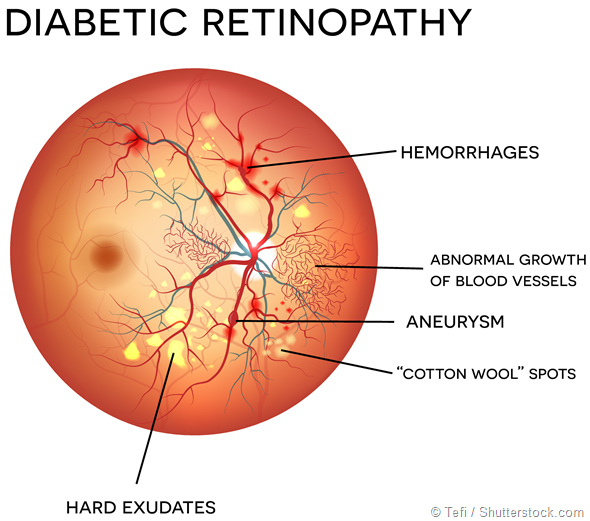
Diabetic Retinopathy is a condition in which your eyes get affected when you have high diabetes for a prolonged period of time. High diabetes can damage the blood vessels of the light sensitive tissue at the back of the eye and can lead to vision loss. At first you may experience only a mild vision loss but if left untreated it can cause severe blindness.
What are the symptoms of diabetic Retinopathy
Although Diabetic Retinopathy cannot be detected early, but if left untreated you can experience symptoms such as:
- Spots or dark strings floating in your vision ( floaters )
- Blurred or fluctuating vision
- Dark or empty areas in the vision ( scotomas )
- Vision Loss
Diabetic Retinopathy can happen in anyone suffering from Type I Diabetes or Type II Diabetes and can affect both the eyes.
What are the causes of Diabetic Retinopathy:
The underlying cause for Diabetic Retinopathy is majorly associated with Diabetes. Over time too much sugar in your blood can lead to blockage of the tiny blood vessels in your retina that nourishes it. Thus resulting in new blood vessels being created by the eye which don’t develop properly and can leak easily. Diabetic Retinopathy also develops faster in patients who have associated nephropathy, anemia or smoking habits.
There are majorly 2 types of Diabetic Retinopathy:
- Non-Proliferative Diabetic Retinopathy (NPDR): In NDPR, the walls of the blood vessels in your retina weaken. Tiny bulges (microaneurysms) protrude from the vessel walls of the smaller vessels, sometimes leaking fluid and blood into the retina. Larger retinal vessels can begin to dilate and become irregular in diameter, as well.
- Proliferative Diabetic Retinopathy ( PDR ): In this type, damaged blood vessels close off, causing the growth of new, abnormal blood vessels in the retina, and can leak blood into the clear, jelly-like substance that fills the center of your eye. These new blood vessels can form scar tissue. Scar tissue can cause problems with the macula or lead to a detached retina. PDR is very serious and can steal both your central and peripheral (side) vision.
Prevention:
Some of the common methods in which you can prevent Diabetic Retinopathy are:
- Try to manage your Diabetes
- Always monitor your Blood Sugar level
- Mild exercises atleast for 1 hr everyday
- Consult a Doctor and take correct medicines
- Stop Smoking
- Pay attention to changes in your vision over time.
How can Diabetic Retinopathy be treated:
With proper medication and care, Diabetic Retinopathy can be treated. Taking an active role in managing your Diabetes is also a huge part of ensuring that Diabetic Retinopathy does not occur.
Medical control
Controlling your blood sugar and blood pressure can stop vision loss. Carefully follow the diet your nutritionist has recommended. Take the medicine your diabetes doctor prescribed for you. Sometimes, good sugar control can even bring some of your vision back.Controlling your blood pressure keeps your eye’s blood vessels healthy.
Medicine
One type of medication is called anti-VEGF medication. These include Avastin, Eylea, and Lucentis. Anti-VEGF medication helps to reduce swelling of the macula, slowing vision loss and perhaps improving vision. This drug is given by injections (shots) in the eye. Steroid medicine is another option to reduce macular swelling. This is also given as injections in the eye. Your doctor will recommend how many medication injections you will need over time.
Laser surgery
Laser surgery might be used to help seal off leaking blood vessels. This can reduce swelling of the retina. Laser surgery can also help shrink blood vessels and prevent them from growing again. Sometimes more than one treatment is needed.
For advanced PDR Vitreoretinal surgery may also be needed to remove the blood from the eye and to reattach the retina.
At Cosmos eye care we have a got a team of highly trained professionals who are engaged in ensuring that you get the right kind of treatment for Diabetic Retinopathy.
For more details visit us at our clinic in Gurgaon, or call us on +91 – 9599229744 for booking an appointment.
